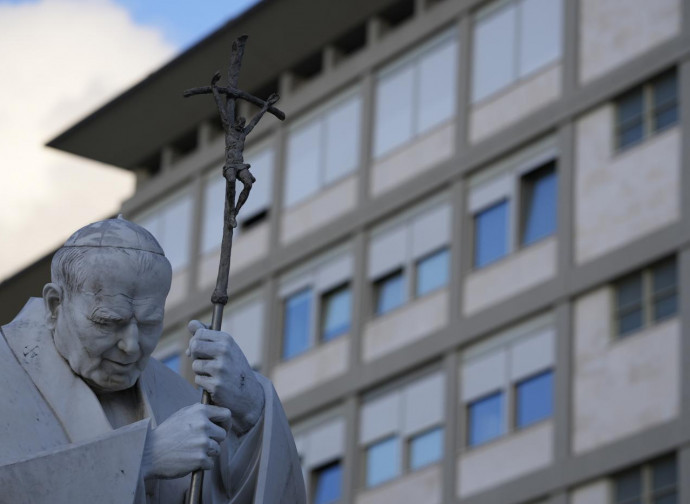Veritatis Splendor, 30th anniversary of a forgotten encyclical
The Vatican media ignored the 30th anniversary of Veritatis Splendor, St John Paul II's encyclical that denounced the misrepresentations of Catholic morality on fundamental issues. As those misrepresentations have now become the rule in the Church, commemorating the encyclical becomes compromising.

On 6 August 30 years ago, John Paul II published the encyclical Veritatis Splendor “on some fundamental questions of the Church's moral teaching”. The Osservatore Romano did not mention the anniversary. Vatican News did not mention it. Nor did Avvenire, (Italian Bishop’s newspaper). It is true that usually it’s the 25th and 50th anniversaries of such events that are remembered, as is the case with weddings, just as it is true that WYD has monopolised Church communication these last few days, but such general forgetfulness, nonetheless, leaves one astonished. This attitude expresses well the contempt that the official Church devotes to the encyclical on morals of a great Pontiff.
Veritatis Splendor does not contain all Catholic moral doctrine, its purpose was to denounce and correct certain misrepresentations of Catholic morality on fundamental issues. Now, since those misrepresentations have become the rule in the Church, commemorating the encyclical becomes compromising. Better not to mention it, to abandon it in the whirlpool of oblivion, as if it had never been written. How would it be possible, without blushing, to recall that encyclical these days without noticing that it clashes with Amoris Laetitia and in general with the status of moral theology under Pope Francis? How would it be possible to pass off such an obvious and substantial difference as continuity? In fact, to find commemorations of this 30th anniversary one has to refer to centres of thought more or less critical of the abandonment of that perspective on moral theology, such as The Catholic Thing or Crisis Magazine.
The condemnation of Veritatis Splendor and the damnatio memoriae ordered in its regard do not take place openly, but in the shadowlands. In the current pontificate there has been no document revising what John Paul II taught. In other words: why Veritatis Splendor should be left adrift has never been explained. What was wrong or inadequate in it has never been expressed. It was decided to simply move on, to turn the page. Time passes, people forget, and those who continue to keep it in mind and point out the contradictions with the new teachings will sooner or later grow weary and it will all come to nothing.
But the Church that turns over a new leaf is like an army that leaves its soldiers in enemy territory, abandoning them. Veritatis Splendor, and the same can be said for Humanae Vitae, are not just texts to put in the archives: on them many Christians have built the battle of their lives. Obliviating those documents without saying why means abandoning those fellow travellers to themselves.
Of this turning of the page in silence, of this pretending that the elephant in the room does not exist, of this proceeding as if everything began after Veritatis Splendor, two aspects are particularly striking. One concerns the method and the other the content.
The imposition from above of the new course of Catholic moral theology that is antithetical to Veritatis Splendor has taken place not only without explaining the whys and wherefores, but also by means of sleights of hand and political manoeuvres, through subterfuges and ploys, in other words in an unseemly manner. The history of the John Paul II Institute testifies to contempt for persons, political machinations, a new juridical collocation invented ad hoc and functional to the substantial transformation of the Institute's purpose. Ways could have been chosen that were less damaging to the memory of John Paul II and less disrespectful to those who had validly committed themselves to that institution.
The appointments of controversial members of the Pontifical Academies, the provocative statements on issues of theological ethics by the President of the Pontifical Academy for Life, the creative slogans uttered by Francis in various interviews, the promotion in the Church of personalities aligned with the new perspectives of Catholic ethics, the provocation and management of revolutionary processes such as the synods on the family, the footnotes to Amoris Laetitia ... in these unorthodox and disrespectful ways the grave of Veritatis Splendor has been dug.
As for the content aspect, it must be noted that the damnatio memoriae was total, no aspect of it was saved, no mercy for the vanquished. Not saved were the encyclical's fundamental theology of reference, the anthropological vision underlying it, the problems of knowledge of the natural and revealed norm, the relationship between the two, the relationship between the norm and conscience, the existence of actions that are always erroneous and should never be performed at any time, the evaluation of the role of circumstances, the objective and public aspect of sin, the very view of sin now seen as inadequacy in relation to an ideal, the possibility of legally recognising actions against the natural law and the very conception of the natural moral law.
No part of Veritatis Splendor has been saved. The encyclical does not exist. So, why commemorate it?
